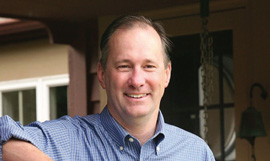When the boys were in high school and still lived at home, our phone rang one evening. It was a friend calling to see if we wanted to meet the Dalai Lama, who was coming to Indianapolis the next day to give a speech. Yes, we thought we did. So Joan took a day of vacation and we pulled the boys out of school and drove downtown the next morning to the Banker’s Life Fieldhouse where the Dalai Lama was speaking. When we arrived, we were ushered into a small room with about ten other people to wait for the Dalai Lama. As you can imagine, some of the people were very nervous. I wasn’t, because I was accustomed to famous people, having met Cowboy Bob at the Indiana State Fair when I was a kid.
After a half hour or so, we heard voices and in walked the Dalai Lama. When I shook his hand, I felt this tingle of energy, which kind of surprised me and made me wonder if there was some rare, mystical quality he had born with, that caused him to stand out. I was thinking about that this week because of Christmas and the birth of Jesus. What I thought about was this—are people like the Dalai Lama and Jesus born special, or do they become special? We know Tibetan Buddhists and Christians believe the Dalai Lama and Jesus were born with a special status. That is what both traditions teach, that each of them were marked from birth with mystical characteristics.
The 14th Dalai Lama, like Jesus, was born in humble circumstances, on a straw mat in a cow’s shed in a remote corner of Tibet in 1935 to a poor farmer and his wife, one of 16 children. At the age of four, Buddhist monks traveling through his small village identified him as the reincarnation of Buddha and his parents surrendered him to the care of the monks, who raised him. How would you raise a child if you knew him to be the reincarnation of the Buddha? Or Jesus, if you knew him to be the son of God?
Both Jesus and the Dalai Lama were heralded at a young age. Jesus by the angel Gabriel, the shepherds, and the wise men; the Dalai Lama by Buddhist monks. Both were feared by governmental authorities—Jesus by King Herod, and the Dalai Lama by the Chinese government. Interestingly, the Chinese government has announced that they, and they alone, will select the 15th Dalai Lama. I have a feeling that’s not going to work out. Both Jesus and the Dalai Lama are believed to be immortal. When Jesus died, his followers said his spirit lived on. When the Dalai Lama dies, his followers believe he will be reincarnated. And the core message of both is the same. They each taught compassion or kindness as the supreme virtue. We’ve been thinking about the fruits of the spirit—love, joy, peace, patience, kindness, goodness, gentleness, faithfulness and self-control. Today, we’re thinking about compassion or kindness. And specifically about the power of compassion, the power of kindness, and its ability to transform us.
Now here is my question: Were Jesus and the Dalai Lama born with this holy, mystical status, or did they become who they were through the power of compassion? Were they born special, or did they become special because of the how they were treated and how they treated others?
I know it’s probably heretical to cast doubt on the mythical origins of Jesus the Sunday before Christmas, but I’ve come to believe that what makes someone special isn’t how they were born, but what they’ve become by virtue of their exposure to compassion. I’ve come to believe one isn’t born the Dalai Lama or born the Christ, one becomes the Dalai Lama, one becomes the Christ, to the degree they are immersed in a climate of compassion. We aren’t born into some exalted state of spiritual maturity. But when we receive compassion and extend it to others, we become spiritually mature. Conversely, if compassion is withheld from us and we withhold it from others, our chances for growth are compromised. We thrive or wither by the presence or absence of compassion.
When I was young, I thought compassion was a sign of weakness. I believed compassion and kindness were feminine characteristics, and men were required to be tough and remote. Mothers were compassionate, fathers were in charge of discipline.
But now I realize compassion is born in strength, not weakness. After all, it is the weak who fear the vulnerability of compassion. The bully is not cruel because he is strong, but because he is weak, because he is fearful, and appeals to the weakness and fears in others. Compassion takes courage.
When the adulterous woman was hauled before Jesus and he alone among the crowd stood compassionately by her side, was he fearful or brave? Weak or strong? Compassion takes courage.
When our fellow Quaker, Lucy Duncan of the American Friends Service Committee, went to our southern border earlier this month to protest the inhumane treatment of refugees and was arrested and herded together with fellow religious leaders and hauled off in a paddy wagon, was she being weak or strong? Compassion takes courage.
You know what I think? I think there are other Jesus’s and Dalai Lama’s in the world today. Right out in the open. Maybe someone in this room. And if you want to know who they are, the only thing you have to do is look for compassion, look for those brave souls who are never afraid to do the right and loving thing, even if everyone else is doing the wrong and hateful thing. I don’t think any of us are born that way, but I believe each of us can become that way, and when that spirit of compassion is born in us, Christ is born again.

